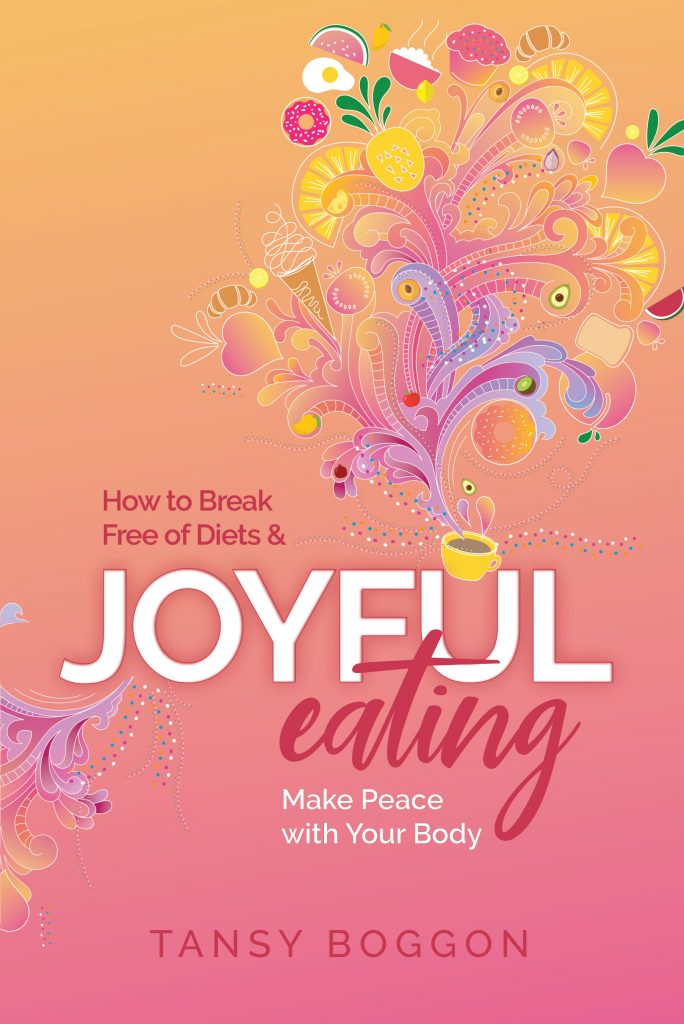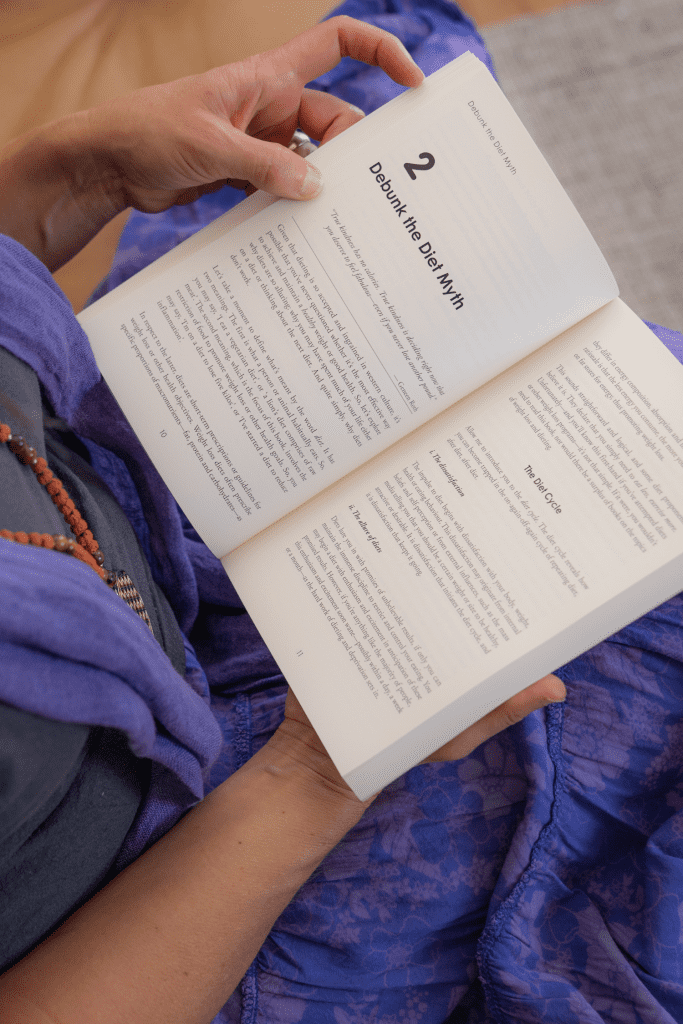The line between eating ‘healthy’ and it becoming an unhealthy obsession, which impedes quality of life and mental health, can be hard to distinguish. In this blog, I share my personal experiences and perspective on orthorexia and orthorexic tendencies.
Orthorexia is an unhealthy obsession with healthy eating.
I believe a fine line exists between an enthusiastic pursuit of eating ‘healthy’ and disordered eating behaviour. For this reason, I no longer prescribe to any specific diets or advise others on their eating. I now know the potential harm that diets can cause, even when diet proponents are well-intentioned—my past self included.
You may wonder, what could be the harm in promoting healthy eating or aspiring for optimal health?
Signs of orthorexia
Although the initial intentions and motivations may be health, a pursuit of health or eating ‘healthy’ can become unhealthy when:
- We eliminate foods or entire food groups, leading to restriction of foods deemed ‘unhealthy’.
- We aspire for perfection and control over our eating and feel distressed when we fall short of our eating ideals.
- We feel anxious (or panic) about how food is sourced and prepared.
- We feel immense guilt and shame when we are unable to follow our food rules.
- We forgo taste in preference for what is deemed healthy.
- We avoid social events, isolating ourselves due to food fears or fear of others’ judgement of our eating behaviours.
- We can no longer be spontaneous and flexible with food.
- We compulsively check ingredient lists and nutrition labels.
- We perform ritualistic food preparation routines.
- We think about food incessantly so that it consumes much of our day.
- We spend more money on food because we believe it is healthier.
- We believe there is a ‘right’ way to eat and keep searching for or enforcing it.
- We judge ourselves or others for food choices and eating behaviours.
- We use our eating behaviours as a coping mechanism for negative thoughts and feelings or feeling out of control in life.
- We take an existing theory about healthy eating and adapt it to our own beliefs. Thus, justifying our eating behaviours or food choices.
- We may try to convince the people in our lives to follow our healthy eating habits or speak dismissively of nutrition professionals and dietary guidelines.
- We attach our self-worth to our eating or health.
- We body check, measuring ourselves against some ideal of health.
A diet in disguise
I think an insightful question to ask ourselves to determine whether our relationship with food is teetering towards an unhealthy obsession is:
- How do I feel when I break my food or eating rules?
If we feel anxious, disgusting, an intense urge to regain control of our eating or to cleanse for our wrongdoings, our eating has likely shifted from health-promoting to harmful.
There are many lifestyle programs, or ways of eating that people declare are not a diet. However, they are mostly diets in disguise. Whether eating for weight loss or health, both can become unhealthy.
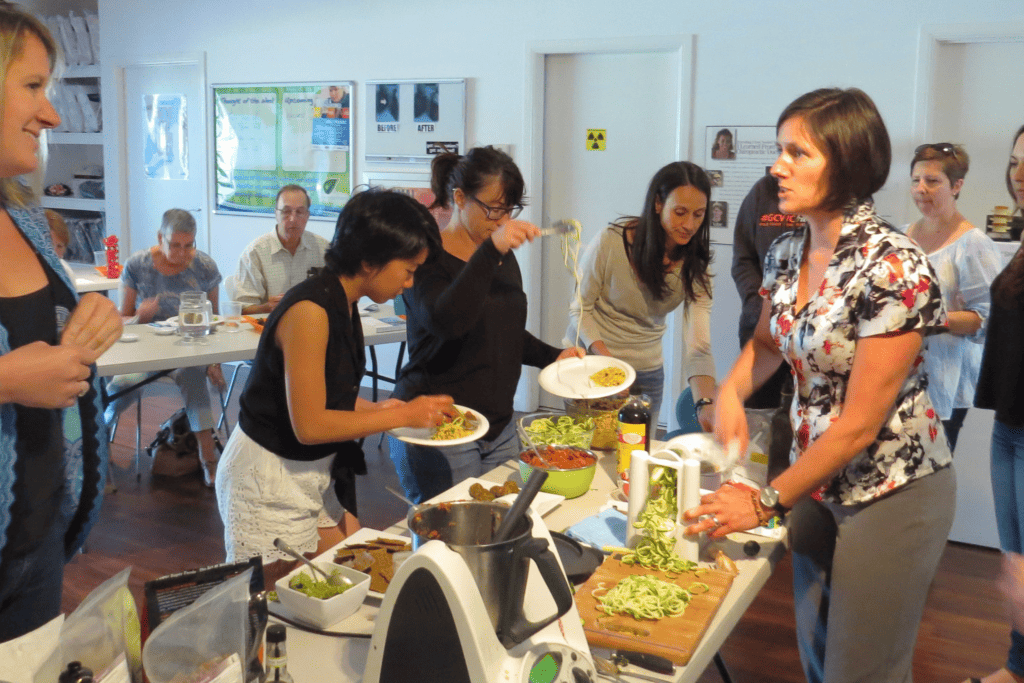
Orthorexic tendencies vs. eating disorder
In my years of eating a raw food diet and cutting out processed foods, I exhibited some orthorexic tendencies.
I had cut out entire food groups. I definitely avoided eating out as I didn’t know how the food was prepared. I would take my own food to social events, so I knew there was something there I could eat. And I would sometimes skip a meal rather than eat something I perceived as unhealthy.
Others praised my eating, and it did become something of my identity. Actually, it had for much of my life.
Tansy only eats healthy, people would say as they passed out slices of birthday cake, passing me by.
When I was younger, even in my teens, there was a sense of pride in my self-control and the priority I put on my health. My health and pursuit of health had become something of my identity.
You may wonder how that can become unhealthy.
When an obsession with healthy eating becomes unhealthy
Like someone on the road to anorexia who is praised for their weight loss until it clearly is no longer ‘healthy’, those who pursue healthy eating may be praised to the extent that their illness goes unnoticed.
For these reasons, comments on anyone’s weight or eating are never helpful. Instead, they may be a catalyst for or reinforce potentially harmful behaviours.

Orthorexia nervosa as an eating disorder
Orthorexia nervosa, first described by Steven Bratman in 1997, is not listed as an eating disorder in the DSM (Diagnostic and Statistical Manual of Mental Disorders).
However, orthorexia nervosa shares many characteristics with eating disorders and may be diagnosed as OSFED (Other Specified Feeding or Eating Disorder) or coexist alongside other eating disorders.
For example, someone’s pursuit of eating ‘healthy’ may lead to insufficient food consumption and, thus, an orthorexic version of anorexia nervosa. Alternatively, eating healthy all week to binge on the weekend or cheat days and later compensate by excessive exercise, detox products, or enemas may be an orthorexic version of bulimia nervosa.
Orthorexia goes beyond a tendency to eat healthy to disordered eating when it impairs someone’s quality of life, comes with a constant intrusive inner critic or becomes a coping mechanism for negative thoughts and feelings or to feel in control. We may reach a point where we know our eating behaviours aren’t normal, but due to rigidity in our food rules, we may isolate to shield ourselves from others’ judgement or concerns. It may be that we can no longer cope with our emotions through any other means than our eating behaviours.
Whether diagnosed with an eating disorder or not, when quality of life is impaired or food is constantly on our minds, it’s time to seek help.
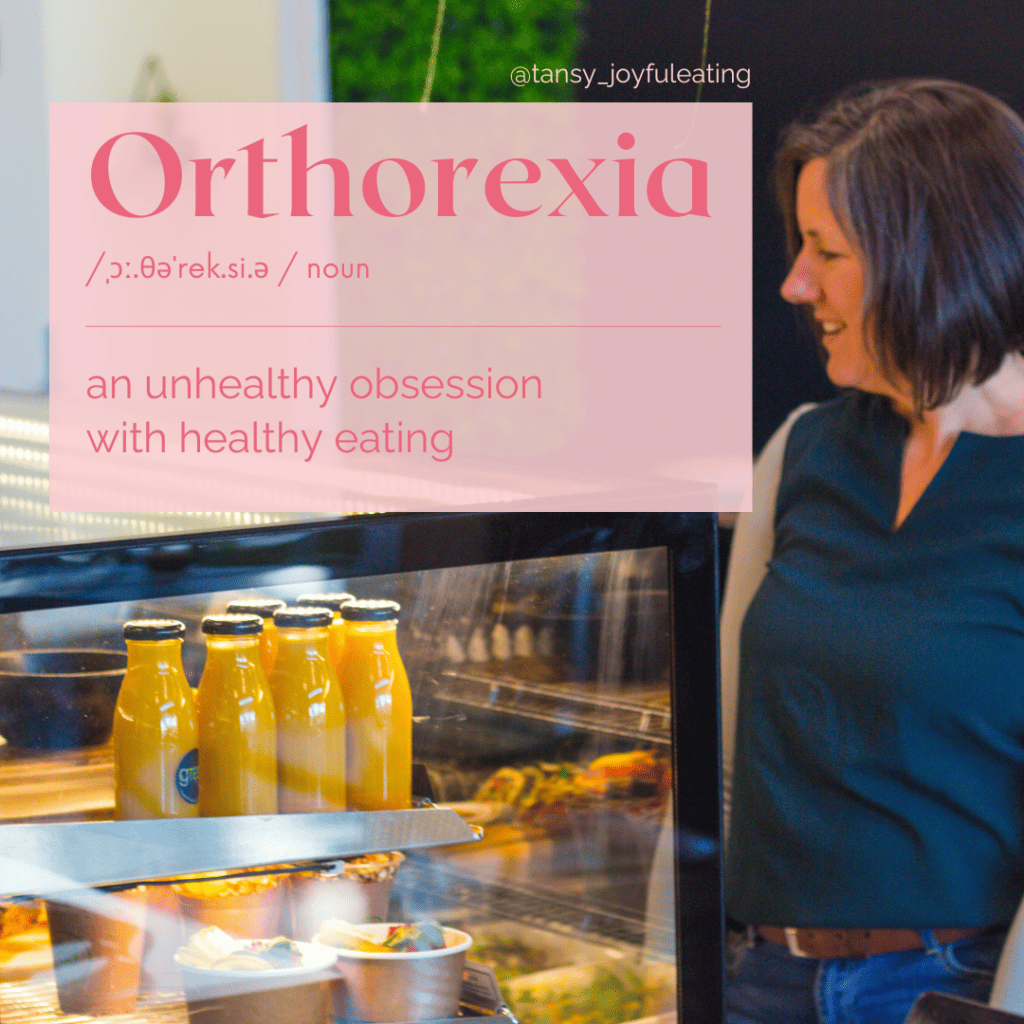
Orthorexia recovery—releasing my orthorexic tendencies
I can only imagine how hard it is to quieten that inner critic voice that tells you how and what to or not to eat.
I only experienced orthorexic tendencies and didn’t develop what I would consider an eating disorder.
Yes, I avoided many foods. However, once I realised how unhealthy my eating behaviour and mindset had become, I was able to reintroduce ‘fear foods’ and form a more balanced and joyful relationship with food.
Expanding food exposure
I remember being away on a camp and eating peanut butter on toast for the first time in years. And hey, I lived through the experience!
It was a turning point that saw me introducing foods I had restricted for years.
I think eating with others and seeing how others ate helped me normalise my eating.
Disengaging from diet talk
Although I had disengaged from talking about body size, weight or calories for years when I began my raw food journey, I was still very much engaged in thinking and talking about what is healthy. I actively shared what I ate on social media. I taught wellness and raw food preparation classes.
I was never dogmatic or forceful in my food beliefs. However, I can now see how sharing my food beliefs and opinions influenced others—either changing their eating behaviours or causing them to feel lesser than if their eating didn’t match mine.
I started to see how sharing our food choices and beliefs can be harmful. Harmful to others in setting unrealistic expectations, but also to ourselves. I had created something of a healthy identity that I had to maintain. I had to look the image of health. And given that society’s perception of health is so intertwined with weight—I had to maintain what would be perceived as a healthy weight, plus glowing skin and good health.
For these reasons, disengaging from diet talk and detangling my identity from what I ate or my health and weight was an important part of healing my relationship with food.
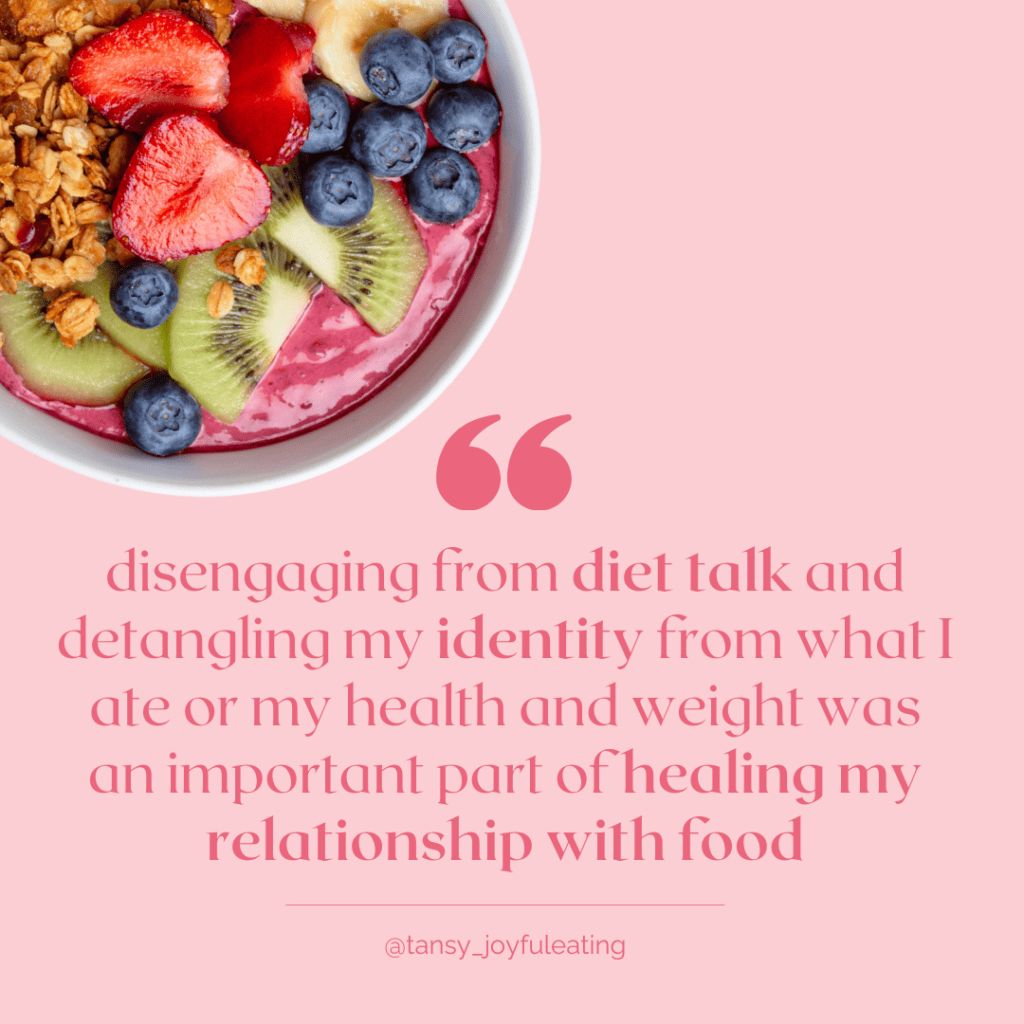
Unravelling self-identity from eating and body
I grew up vegetarian and, over the past fifteen years, have become aware of how gluten causes me to bloat. At first, the bloating was an aesthetic issue. So, I avoided gluten to prevent stomach distention. And I definitely think my gluten intolerance led me down the path of somewhat obsessive healthy eating.
However, in recent years, and maybe it is an age thing, even the smallest amount of gluten (e.g. a dash of soy sauce or oats) causes severe bloating and uterine inflammation (I’ve recently been diagnosed with adenomyosis). So, gluten is something I avoid.
But it does mean that my eating, as a gluten-free vegetarian, can be perceived as healthy by others.
I try to diffuse comments about my eating being ‘healthy’ and reinforce that we can eat in many ways to suit our lifestyle, preferences, traditions and beliefs. I also make choices based on taste and preference rather than solely on health. Fortunately, you can now easily find gluten-free, vegetarian burgers or pizza on pub menus!
However, many people perceive that their eating and body says something about who they are—their self-worth. Detangling these false beliefs, I believe, is an important aspect of resisting orthorexic thinking.
Releasing the fear of illness or death
Orthorexic tendencies may be founded on a desire for perfection or to eat ‘right’. However, orthorexic thinking can also stem from a fear of illness and death, especially dying in a drawn-out or painful way.
I believe this motivation can be a strong driver for those of us who have had first-hand experience with illness, whether our own or our loved ones. I discuss this in my blog about My Food and Body Story and YouTube video, My Story to Joyful Eating.
I grew up with a fear of diabetes and heart disease. I also spent time in a lung and heart hospital where people were waiting for heart transplants or the right combination of medications to leave the hospital and say goodbye to their family or have their last holiday before their quality of life diminished or they passed away.
So, I wanted to be healthy. I wanted to live to a ripe old age with all my faculties and health.
Is it any wonder the concept of optimal health is so appealing? That some of us want to gain ‘control’ over our health and extend our life expectancy?
Acknowledging that no diet can guarantee health or prevent death
Although it is true we can influence our health and how we feel in our bodies, “no lifestyle program, superfood, supplement or exercise regime can guarantee optimal health or even the prevention of disease and illness.”—Joyful Eating: How to Break Free of Diets and Make Peace with Your Body.
I had to release my fear of dying and my belief that I control when and how I die. Or that I can’t enjoy a quality life if I am unwell or incapacitated physically.
Despite the platitudes, your health may not be the most important thing you can give those you love. Furthermore, your health and well-being are more than what you eat or how you move your body. There are many aspects to health.
If our pursuit of health gets in the way of other aspects of well-being, such as social connection or feeling content, it is no longer healthy. When our pursuit of health causes us to feel stressed, anxious, guilty and ashamed, it’s no longer healthy.
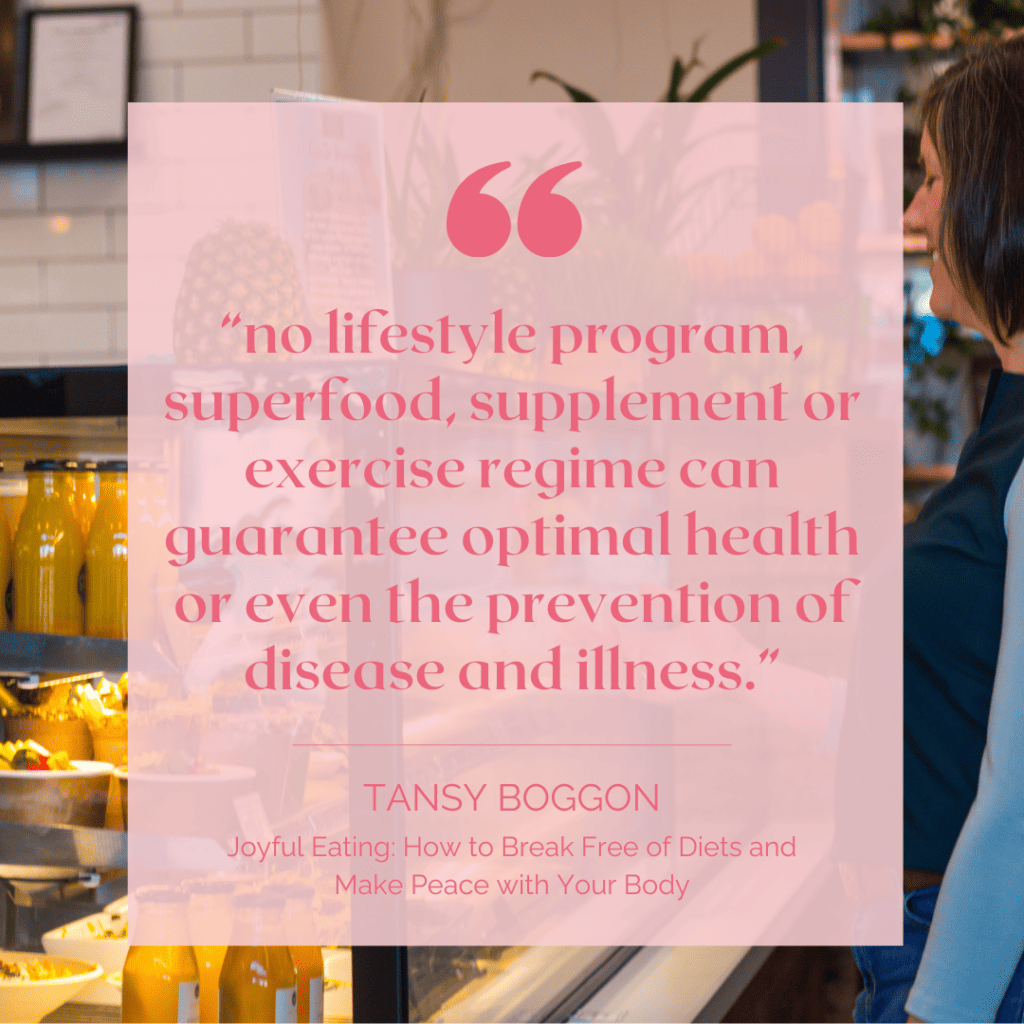
Cultivating body trust
Like any dieting, whether for weight loss or health, restricting our eating and following strict food rules can lead to an obsession with food.
In the case of orthorexic tendencies, constantly thinking about foods deemed as unhealthy can reinforce the belief that unhealthy foods create food cravings and cause us to be out of control with these foods.
For me, chocolate and sugar were the problems, not that I had restricted my chocolate and sugar eating to the weekends only. So, when the reins were released… Well, you know how that story goes!
Diet mentality causes us to demonise foods. However, it’s not the food but our eating rules and attempts to control our eating, which lead us to distrust these foods, our bodies and ourselves.
Allowing myself to eat everything and anything with my full awareness and no restriction enabled me to cultivate trust and an intuitive approach to eating, which is far more joyful.
Relaxing when eating and eating for joy
Over the years of sharing my raw food journey, I made acquaintances with people with dubious food beliefs.
Seeing how adamantly they believed certain food rules and how they spoke about them with so much conviction started to concern me. Not only was I starting to wonder if there really was one diet that suited everyone and whether we are truly in control of our health destiny, I was also beginning to wonder what toll trying to eat ‘right’ was having on our digestion and bodies. I became curious as to whether the stress of eating ‘right’ counteracted the pursuit of eating perfectly.
I remember hearing a wellness influencer speaking at an event. He was sharing the recipe for a green concoction. He confessed that it didn’t taste good, but that’s what we did in the name of health. He said that even if we had to pinch our noses to get it into us, it was worth it.
It got me thinking. Is gulping down food in this forceful and unpleasant way health-promoting?
I started to wonder and explore the scientific literature to see what role joy plays in our digestion and absorption of nutrients. This questioning led me to write Joyful Eating: How to Break Free of Diets and Make Peace with Your Body.
Joyful Eating: How to Break Free of Diets and Make Peace with Your Body
“… practical tools to help people release their sabotaging thoughts, enabling them to eat more intuitively and find joy in the moment.”
— Michelle Stanton, author of The Timeless World.
Orthorexia treatment and support in orthorexia recovery
Releasing my food rules and identity from my eating and body was integral in forming a joyful relationship with food.
However, where orthorexic tendencies lead to rigid eating disorder behaviours and physical consequences such as malnutrition or rapid weight loss, the support of an interdisciplinary team, including a psychologist or counsellor and dietitian, is recommended.
Orthorexia nervosa can be a serious mental and physical health concern, whether diagnosed or recognised as an eating disorder.
Recovery would include normalising eating, including eliminating fear foods and food rules. However, it is considerably nuanced, and there may be coexisting mental health issues and eating disorder behaviours.
If you suspect you have an eating disorder, including orthorexia, talk with your primary healthcare provider (GP). Even get a second opinion if you don’t feel you’ve been heard or properly diagnosed.
Some organisations that provide useful information and support include:
- EDANZ in New Zealand
- Butterfly Foundation in Australia
- NEDA in the USA
Know that you are not alone. There is always hope. Recovery is possible.
Download the FREE Chapter: Debunk the Diet Myth
Discover the physiological and psychological reasons why diets don’t work, whether for weight loss or a wellness diet that promises ‘optimal health’.
Joyful Eating: How to Break Free of Diets and Make Peace with Your Body
Feel you have orthorexic tendencies? Or need support in your relationship with food?
As a nutrition counsellor, providing eating disorder support is outside my scope of practice. However, I am passionate about supporting individuals who constantly think about dieting or tweaking their eating to get it ‘perfect’.
I aspire to guide people in achieving food freedom and experiencing a peaceful and joyful relationship with food and their body.
Feel free to reach out if you’d like support with your eating or weight concerns. You can learn more about my nutrition counselling services here.
Much joy,
Tansy

